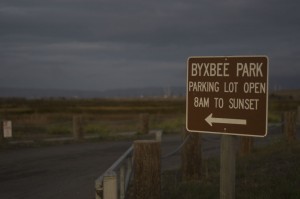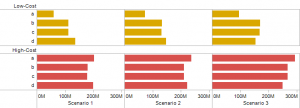
With all of the votes counted, Palo Alto has approved the ballot measure to re-designate city parklands as a composting site.
The initiative, known as Measure E, passed by almost two-thirds of the vote. It pitted environmentalists against one another. Composting proponents faced off with park advocates.
Although the measure passed with 64.38 percent of the vote, opponents are not ready to give up the fight. “There are years of controversy over the issue,” said Enid Pearson, a former City Council member who opposes the building of the facility. Despite the allocation of land for its construction, she believes “the plant probably won’t happen in the future. For the next step, we are going to see what options we still have.”
The proposal designates 10 acres of Palo Alto’s Byxbee Park for an organic-waste processing facility, or composting site, for yard trimmings, sewage and food scraps. The city offered the ballot measure because it is not allowed to develop parkland unless residents first vote to undedicate the land.
Palo Alto officials say they are pushing the city to become more environmentally friendly, especially in regards to waste management. However, increased recycling is actually costing the city money.
This financial conundrum prompted they city to propose new waste management policies, such as Measure E, it hopes will be both economic and environmentally friendly.
Supporters and opponents of the Measure E debate both argued that their stances complied with the city’s economic and environmental priorities. Proponents claim that a local composting site could eliminate environmentally damaging practices in a cost-effective manner. Opponents say the measure would set a dangerous precedent and does not present a financially practicable solution.
The city’s goal is to no longer produce garbage for landfills by 2021, and so far, Palo Alto has significantly reduced its waste. From 2007 to 2009, Palo Alto experienced a 44 percent drop in the total amount of garbage it produces. However, this is also creating financial difficulties for the city.
Profits from garbage collection are dropping, and the city is locked into two waste-management contracts that obligate them to deliver a certain amount of garbage to the landfill, or pay for every ton they do not produce. With the city already experiencing a large financial drain due to antiquated waste management policies, the economics of new waste management proposals becomes increasingly important.
The debate over Measure E centered on whether creating a local composting site is the most economic solution for Palo Alto’s organic waste management. The measure does not actually establish the type of organic waste management plant to be built. It simply dedicates the land for the possibility of a facility at some indefinite date in the future. Since potential costs of the facility range from $60 million, less than the cost of exporting waste, to over $200 million, dramatically more than the cost of exporting, activists on both sides of the debate claimed to have the most cost-effective solution.

Therefore, arguments for both sides have centered largely around the environmental impact of creating a composting site at Byxbee Park.
Those in favor of allocating the land for a compost site say it will allow the city to explore the best solutions for waste management in the future. “Support for Measure E allows further research of the waste-to-energy facility options,” said Mary Alice Thornton, the President of the League of Women Voters of Palo Alto.
Additionally, implementing anaerobic digestion, the composting technology recommended for the new plant, could eliminate the current environmentally damaging practices the city uses for processing sewage.
“Palo Alto has a dirty little secret,” former mayor of Palo Alto Peter Drekmeier said. “We are one of two communities left in California that incinerates sewage sludge. With anaerobic digestion, we can retire the incinerator and digest waste products to biogas to power waste treatment.”
Drekmeier added that a local waste-management solution will decrease the city’s greenhouse gas emissions, from trucks that haul waste to San Jose and Gilroy.
Employees of Acterra, a nonprofit environmental education and action organization based in Palo Alto, say they support the measure because they feel the facility planned for the land could reduce the environmental impact of waste management and reduce the region’s carbon footprint.
Opponents, however, say the process of creating an organic waste management facility will temporarily increase greenhouse gas emissions. Construction on the site of Byxbee Park, a former landfill, would include digging up 200 million cubic feet of garbage, and releasing “tons” of the greenhouse gas methane.
They also say the passage of Measure E will put extra pressure on the city council to spend resources researching the feasibility of using anaerobic digestion to process all three of Palo Alto’s types of organic waste: yard trimmings, sewage and food scraps.
If it passes, the supporters “will then use its approval to go to the council and say we can’t just let it sit there, we have to figure out how to make it work. So let’s spend some money to make anaerobic digestion prove successful. This is not what the city should be doing,” said Palo Alto Patch columnist Bob Moss.
Reallocating parkland for another purpose could also set a dangerous precedent, opponents say. The official argument against the measure says, “When the government looks to our parks for public works projects, and voters allow it, no park will ever be safe from such land grabs. Once irreplaceable parkland is gone, it’s gone forever.”
Palo Alto Mayor Sid Espinosa has a special stake against the measure. He based his campaign on the promise he would not support reallocating parkland.
“There are a lot of admiral competing objectives,” he said, “like affordable housing. People come and say, ‘Couldn’t we take a corner of this park for affordable housing? Or some revenue-generating initiatives like car dealerships, or hotels, could make a lot of money for the city, and that money could go to help sustain our parks.’ So it can go back into the issue, but once you take away parkland you just don’t get it back – whatever you’re putting on it, it’s highly likely that it’s not going to be parkland.”
Peninsula Press staff writers Roseanne Cima, Saman Khan and Georgia Wells contributed to this report.
Follow the Peninsula Press live blog on Measure E and more:

Way to go Palo Alto citizens!!! This is a vote for green tech and your future. Communities everywhere should stop using fossil fuels to ship their garbage to other communities. Release the stranglehold that the garbage industry maintains over the quality of our environments!